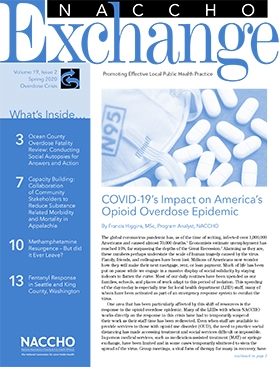
COVID-19’s Impact on America’s Opioid Epidemic
By Francis Higgins, MSc, Senior Program Assistant, NACCHO
The global coronavirus pandemic has, as of the time of writing, infected over 1,000,000 Americans and caused almost 70,000 deaths.1 Economists estimate unemployment has reached 16%, far surpassing the depths of the Great Recession.2 Alarming as they are, these numbers perhaps understate the scale of human tragedy caused by the virus. Family, friends, and colleagues have been lost. Millions of Americans now wonder how they will make their next mortgage, rent, or loan payment. Much of life has been put on pause while we engage in a massive display of social solidarity by staying indoors to flatten the curve. Most of our daily routines have been upended as our families, schools, and places of work adapt to this period of isolation. This upending of the day-to-day is especially true for local health department (LHD) staff, many of whom have been activated as part of an emergency response system to combat the virus.
One area that has been particularly affected by this shift of resources is the response to the opioid overdose epidemic. Many of the LHDs with whom NACCHO works directly on the response to this crisis have had to temporarily suspend their work as their staff time has been redirected. Even when staff are available to provide services to those with opioid use disorder (OUD), the need to practice social distancing has made accessing treatment and social services difficult or impossible. In-person medical services, such as medication-assisted treatment (MAT) or syringe exchange, have been limited and in some cases temporarily shuttered to stem the spread of the virus. Group meetings, a vital form of therapy for many in recovery, have been put on hold. Many rehabilitation centers and peer recovery coach initiatives have stopped accepting new clients.
In addition to decreasing the accessibility of services, the distancing guidelines have increased the risk of opioid use. Official guidelines that recommend never using opioids alone are not compatible with our new isolated reality. Those who previously practiced harm reduction by using drugs with a friend may now use alone—without someone to administer naloxone or call 911 in the event of an overdose. Should an overdose occur, overstretched first responders and medical systems may struggle to provide timely care. There have even been reports indicating that some first responders are unwilling to administer naloxone for fear of coming into contact with the virus.


